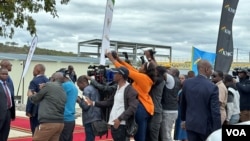Marking this year’s World Press Freedom Day, Amnesty International said Thursday it is concerned about eastern and southern African authorities’ imposition of severe restrictions on freedom of expression and media freedom.
The organization said there was increased intentional disruption of internet connectivity and the enactment of tough cyber security laws aimed at silencing the media and controlling the spread of information.
Sarah Kimani, the media manager of Amnesty International in east and southern Africa, outlined other ways governments are hampering the media.
“Some of the issues we documented include the fact that across the east and southern Africa region, authorities used national security laws, including counterterrorism and cybersecurity legislation, to undermine the right to freedom of expression, punish journalists and suppress media freedom,” she said.
“For example, in Madagascar, the Cybercriminality Code and the Communication Code have forced journalists to self-censor due to fear of reprisals,” Kimani said. “The laws are broad, and vaguely defined provisions within the laws — such as attacks on state security, defamation, dissemination of fake news and incitement to hatred — have been used to intimidate, harass and target journalists.”
Kimani said Burundi, the Democratic Republic of Congo, Lesotho, Mozambique, Somalia, South Sudan, Zambia and Zimbabwe are other countries where Amnesty recorded serious violations over the past year.
In Zimbabwe, President Emmerson Mnangagwa’s government says it is making a better environment for journalists, having awarded 14 licenses for private radio and television stations in the last few years.
Zimbabwe Information Minister Jenfan Muswere told VOA, "The second republic has made significant progress in ensuring a safe, free and competitive operating environment. This has been done through enactment of media-friendly laws and the repealing of laws that affected media operations. This has also led to the opening up of airwaves for both radio and television, thus ensuring media diversity.”
Muswere said more regulations are yet to come to, in his words, professionalize and allow the independence and co-regulation of the media sector and ensure growth and development.
Tabani Moyo, the director of the Media Institute of Southern Africa, acknowledged Muswere’s comments but said Zimbabwe and several other countries in the region still present a difficult environment for journalists in which to operate.
“All these are the mix of challenges within these countries, including restrictive laws, laws that are curbing civic space, others coming with cyber security laws,” he said. “But what this means is that the region is ... a mixed bag, in terms of going backwards — two steps forward, five backwards.”
This situation, he said, calls for a consolidated approach towards media development at a regional level.
Moyo said it would be helpful if regional bodies such as the Southern African Development Community and the African Union promoted model progressive laws on the issue of media freedom on the continent.













